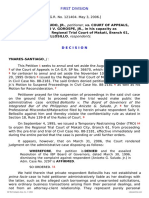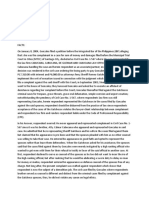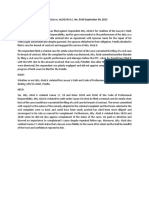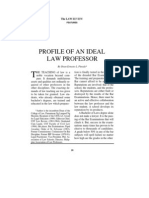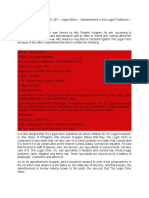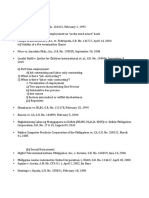0 ratings0% found this document useful (0 votes)
162 viewsTan Tek Beng Vs David
Tan Tek Beng Vs David
Uploaded by
Ramon T. De VeraThe document summarizes a court case regarding a complaint filed against lawyer Timoteo A. David. David had entered into an agreement with non-lawyer Tan TekBeng where Tan would refer clients to David in exchange for 50% of David's fees. The court found the agreement to be void and a form of malpractice, as it amounted to illegally soliciting cases for profit. The court censured David for the unethical agreement, noting that the practice of law is a profession, not a business, and lawyers cannot seek employment through intermediaries.
Copyright:
© All Rights Reserved
Available Formats
Download as DOCX, PDF, TXT or read online from Scribd
Tan Tek Beng Vs David
Tan Tek Beng Vs David
Uploaded by
Ramon T. De Vera0 ratings0% found this document useful (0 votes)
162 views1 pageThe document summarizes a court case regarding a complaint filed against lawyer Timoteo A. David. David had entered into an agreement with non-lawyer Tan TekBeng where Tan would refer clients to David in exchange for 50% of David's fees. The court found the agreement to be void and a form of malpractice, as it amounted to illegally soliciting cases for profit. The court censured David for the unethical agreement, noting that the practice of law is a profession, not a business, and lawyers cannot seek employment through intermediaries.
Original Description:
TAN TEK BENG VS DAVID CASE DIGEST
Original Title
Tan Tek Beng vs David
Copyright
© © All Rights Reserved
Available Formats
DOCX, PDF, TXT or read online from Scribd
Share this document
Did you find this document useful?
Is this content inappropriate?
The document summarizes a court case regarding a complaint filed against lawyer Timoteo A. David. David had entered into an agreement with non-lawyer Tan TekBeng where Tan would refer clients to David in exchange for 50% of David's fees. The court found the agreement to be void and a form of malpractice, as it amounted to illegally soliciting cases for profit. The court censured David for the unethical agreement, noting that the practice of law is a profession, not a business, and lawyers cannot seek employment through intermediaries.
Copyright:
© All Rights Reserved
Available Formats
Download as DOCX, PDF, TXT or read online from Scribd
Download as docx, pdf, or txt
0 ratings0% found this document useful (0 votes)
162 views1 pageTan Tek Beng Vs David
Tan Tek Beng Vs David
Uploaded by
Ramon T. De VeraThe document summarizes a court case regarding a complaint filed against lawyer Timoteo A. David. David had entered into an agreement with non-lawyer Tan TekBeng where Tan would refer clients to David in exchange for 50% of David's fees. The court found the agreement to be void and a form of malpractice, as it amounted to illegally soliciting cases for profit. The court censured David for the unethical agreement, noting that the practice of law is a profession, not a business, and lawyers cannot seek employment through intermediaries.
Copyright:
© All Rights Reserved
Available Formats
Download as DOCX, PDF, TXT or read online from Scribd
Download as docx, pdf, or txt
You are on page 1of 1
SECOND DIVISION
[A.C. No. 1261. December 29, 1983.]
TAN TEK BENG, Complainant, v. TIMOTEO A. DAVID, Respondent.
BasilioLanoria for complainant.
Timoteo A. David for and in his own behalf.
SYLLABUS
1. LEGAL ETHICS; MEMBER OF THE BAR; SOLICITING CASES AT LAW FOR THE PURPOSE OF GAIN; CONSTITUTES MALPRACTICE. Where
in the agreement lawyer David not only agreed to give one-half of his professional fees to an intermediary or commission agent but he also bound
himself not to deal directly with the clients, the Court held that the said agreement is void because it was tantamount to malpractice which is "the practice
of soliciting cases at law for the purpose of gain, either personally or through paid agents or brokers" (Sec. 27, Rule 138, Rules of Court). Malpractice
ordinarily refers to any malfeasance or dereliction of duty committed by a lawyer. Section 27 gives a special and technical meaning to the term
"malpractice" (Act No. 2828, amending Sec. 21 of Act No. 190). That meaning is in consonance with the elementary notion that the practice of law is a
profession, not a business. "The lawyer may not seek or obtain employment by himself or through others for to do so would be unprofessional" (2 R.C.L.
1097 cited in In re Tagorda, 33 Phil. 37, 42).
2. ID.; ID.; ID.; UNPROFESSIONAL CONDUCT; CAUSE FOR CENSURE. The commercialization of law practice is condemned in certain canons of
professional ethics adopted by the American Bar Association. "Unprofessional conduct in an attorney is that which violates the rules or ethical code of
his profession or which is unbecoming a member of that profession" (Note 14, 7 C.J.S. 743). We censure lawyer David for having entered and acted
upon such void and unethical agreement. We discountenance his conduct, not because of the complaint of Tan TekBeng (who did not know legal ethics)
but because David should have known better.
D E C I S I O N AQUINO, J.:
The issue in this case is whether disciplinary action should be taken against lawyer Timoteo A. David (admitted to the bar in 1945) for not giving Tan
TekBeng, a nonlawyer (alleged missionary of the Seventh Day Adventists), one-half of the attorneys fees received by David from the clients supplied by
Tan TekBeng. Their agreement reads:jgc:chanrobles.com.ph
"December 3, 1970
"Mr. Tan TekBeng
"Manila
"Dear Mr. Tan:chanrob1es virtual 1aw library
In compliance with your request, I am now putting into writing our agreement which must be followed in connection with the accounts that you will entrust
to me for collection. Our terms and conditions shall be as follows:jgc:chanrobles.com.ph
"1. On all commission or attorneys fees that we shall receive from our clients by virtue of the collection that we shall be able to effect on their accounts,
we shall divide fifty-fifty. Likewise you are entitled to commission, 50/50 from domestic, inheritance and commercial from our said clients or in any
criminal cases where they are involved.
"2. I shall not deal directly with our clients without your consent.
"3. You shall take care of collecting our fees as well as advances for expenses for the cases referred to us by our clients and careful in safeguarding our
interest.
"4. It is understood that legal expenses that we shall recover from the debtors shall be turned over to our clients. Other clients who directly or indirectly
have been approached or related (sic) to you as a result of your labor are your clients.
"I hereby pledge in the name of God, our Heavenly Father, that I will be sincere, honest and fair with you in connection with our transactions with our
clients. Likewise you must be sincere, honest and fair with me.
Very truly yours,
(Sgd.) Illegible
TIMOTEO A. DAVID
"P.S.
I will be responsible for all documents entrusted me by our clients.
(Sgd.) Initial
"CONFORME to the above and likewise will reciprocate my sincerity to Atty. David as stated in the last paragraph of this letter.
(Sgd.) Tan TekBeng
MR. TAN TEK BENG"
The foregoing was a reiteration of an agreement dated August 5, 1969. Note that in said agreement lawyer David not only agreed to give one-half of his
professional fees to an intermediary or commission agent but he also bound himself not to deal directly with the clients.
The business relationship between David and Tan TekBeng did not last. There were mutual accusations of doublecross. For allegedly not living up to the
agreement, Tan TekBeng in 1973 denounced David to Presidential Assistant Ronaldo B. Zamora, to the Office of Civil Relations at Camp Crame and to
this Court. He did not file any civil action to enforce the agreement.
In his 1974 comment, David clarified that the partnership was composed of himself as manager, Tan TekBeng as assistant manager and lawyer Pedro
Jacinto as president and financier. When Jacinto became ill and the costs of office maintenance mounted, David suggested that Tan TekBeng should
also invest some money or shoulder a part of the business expenses but Tan TekBengrefused.chanrobles.com : virtual law library
This case was referred to the Solicitor General for investigation, report and recommendation. Hearings were scheduled from 1974 to 1981. It was
proposed that respondent should submit a stipulation of facts but that did not materialize because the scheduled hearings were not held due to the
nonavailability of Tan TekBeng and his counsel.
On September 16, 1977 Tan TekBeng died at the Philippine Union Colleges Compound, Baesa, Caloocan City but it was only in the manifestation of his
counsel dated August 10, 1981 that the Solicitor Generals Office was informed of that fact. A report on this case dated March 21, 1983 was submitted by
the Solicitor General to this Court.
We hold that the said agreement is void because it was tantamount to malpractice which is "the practice of soliciting cases at law for the purpose of gain,
either personally or through paid agents or brokers" Sec. 27, Rule 138, Rules of Court). Malpractice ordinarily refers to any malfeasance or dereliction of
duty committed by a lawyer. Section 27 gives a special and technical meaning to the term "malpractice" (Act No. 2828, amending sec. 21 of Act No.
190).
That meaning is in consonance with the elementary notion that the practice of law is a profession, not a business. "The lawyer may not seek or obtain
employment by himself or through others for to do so would be unprofessional" (2 R.C.L. 1097 cited in In re Tagorda, 53 Phil. 37, 42; Malcolm, J., Jayme
v. Bualan, 58 Phil. 422; Arce v. Philippine National Bank, 62 Phil. 569). The commercialization of law practice is condemned in certain canons of
professional ethics adopted by the American Bar Association:jgc:chanrobles.com.ph
"34. Division of Fees. No division of fees for legal services is proper, except with another lawyer, based upon a division of service or
responsibility."cralaw virtua1aw library
"35. Intermediaries. The professional services of a lawyer should not be controlled or exploited by any law agency, personal or corporate, which
intervenes between client and lawyer. A lawyers responsibilities and qualifications are individual. He should avoid all relations which direct the
performance of his duties by or in the interest of such intermediary. A lawyers relation to his client should be personal, and the responsibility should be
direct to the client. . . ."cralaw virtua1aw library
"38. Compensation, Commissions and Rebates. A lawyer should accept no compensation, commissions, rebates or other advantages from others
without the knowledge and consent of his client after full disclosure." (Appendix, Malcolm, Legal Ethics).
We censure lawyer David for having entered and acted upon such void and unethical agreement. We discountenance his conduct, not because of the
complaint of Tan TekBeng (who did not know legal ethics) but because David should have known better.chanrobles law library
"Unprofessional conduct in an attorney is that which violates the rules or ethical code of his profession or which is unbecoming a member of that
profession" (Note 14, 7 C.J.S. 743).
You might also like
- DOPS Revalidation Extension Amendment Form Rev24Oct2018Document2 pagesDOPS Revalidation Extension Amendment Form Rev24Oct2018Zandrine Dela CruzNo ratings yet
- Revenue Regulations No. 9-2000Document4 pagesRevenue Regulations No. 9-2000Ramon T. De VeraNo ratings yet
- Patric DecisionDocument55 pagesPatric DecisionTHROnlineNo ratings yet
- 4 Maiquez V PeopleDocument7 pages4 Maiquez V PeopleFatzie MendozaNo ratings yet
- NOTES-Legal EthicsDocument9 pagesNOTES-Legal Ethicspscv49tr9xNo ratings yet
- San Sebastian College-Recoletos Manila: Remedial Law Review 2Document1 pageSan Sebastian College-Recoletos Manila: Remedial Law Review 2Kitem Kadatuan Jr.No ratings yet
- Republic Act No 7691Document8 pagesRepublic Act No 7691Estela BenegildoNo ratings yet
- Disqualification of Judicial Officers RULE 137Document3 pagesDisqualification of Judicial Officers RULE 137Rafael AdanNo ratings yet
- Comparison - 9g Visa and SRRVDocument2 pagesComparison - 9g Visa and SRRVAnn Garrido-AcevedaNo ratings yet
- 05 SMCEU-PTGWO V SMPPEU-PDMP, G.R. No. 171153, September 12, 2007Document10 pages05 SMCEU-PTGWO V SMPPEU-PDMP, G.R. No. 171153, September 12, 2007Neriz Anne JavierNo ratings yet
- Neypes vs. Court of Appeals: G.R. No. 141524 (2005)Document1 pageNeypes vs. Court of Appeals: G.R. No. 141524 (2005)Harvey BagoNo ratings yet
- 12 Angry MenDocument2 pages12 Angry MenAnonymous PjHuK2kLNo ratings yet
- Osmena V OsmenaDocument5 pagesOsmena V OsmenaCelina Marie PanaliganNo ratings yet
- Legal Ethics CasesDocument116 pagesLegal Ethics CasesPrincess Melanie Melendez100% (1)
- Canlas v. CADocument8 pagesCanlas v. CADonita AparejadoNo ratings yet
- People Vs Sandiganbayan and TanDocument8 pagesPeople Vs Sandiganbayan and TanDenee Vem MatorresNo ratings yet
- Reodica v. CADocument2 pagesReodica v. CAAthina Maricar CabaseNo ratings yet
- FACTS: Spouses Monica and Avelino Palanog Filed A Complaint ForDocument2 pagesFACTS: Spouses Monica and Avelino Palanog Filed A Complaint ForEileen Eika Dela Cruz-LeeNo ratings yet
- Module 6Document7 pagesModule 6saguiaranNo ratings yet
- GR No. 200670 Case DigestDocument2 pagesGR No. 200670 Case DigestJuliaMarieDucutNo ratings yet
- Cpra 2023Document76 pagesCpra 2023Grace RoqueNo ratings yet
- Canlas V Court of AppealsDocument10 pagesCanlas V Court of AppealsAggy AlbotraNo ratings yet
- Petitioner: First DivisionDocument5 pagesPetitioner: First DivisionEulaNo ratings yet
- Doctrine of Constitutional Supremacy: Abio Vs GordonDocument21 pagesDoctrine of Constitutional Supremacy: Abio Vs GordonBrave NeventuraNo ratings yet
- Frias Vs Atty. LozadaDocument2 pagesFrias Vs Atty. LozadaSjaneyNo ratings yet
- Mirant v. CaroDocument3 pagesMirant v. CaroRachelle MaravillaNo ratings yet
- C. Republic Flour Mills, Inc - vs. Commissioner of CustomsDocument2 pagesC. Republic Flour Mills, Inc - vs. Commissioner of CustomsChristine JungoyNo ratings yet
- PDF - Midterm and Final Requirement For Pale OnlineDocument10 pagesPDF - Midterm and Final Requirement For Pale OnlineLibra Sun100% (1)
- G.R. No. 190749 - Zafra Vs PeopleDocument7 pagesG.R. No. 190749 - Zafra Vs PeopleMarkNo ratings yet
- Dacanay vs.Document3 pagesDacanay vs.Rhona MarasiganNo ratings yet
- Pagdanganan Vs Atty PlataDocument6 pagesPagdanganan Vs Atty PlataPLM Law 2021 Block 9No ratings yet
- Who May Rescind: Domestic Adoption Act, Went Into Effect. The New Statute Deleted FromDocument8 pagesWho May Rescind: Domestic Adoption Act, Went Into Effect. The New Statute Deleted FromArianne Grace AberdeNo ratings yet
- Second Division: Samuel B. Arnado, Complainant, vs. Atty. Homobono A. ADAZA, RespondentDocument8 pagesSecond Division: Samuel B. Arnado, Complainant, vs. Atty. Homobono A. ADAZA, RespondentMaria Recheille Banac KinazoNo ratings yet
- Oblicon-Assigned Cases Under ContractsDocument3 pagesOblicon-Assigned Cases Under ContractsSuiNo ratings yet
- Magsalang Vs PeopleDocument5 pagesMagsalang Vs PeoplebchiefulNo ratings yet
- Case Digest de Guzman V. de DiosA.C. No. 4943. January 26, 2001Document2 pagesCase Digest de Guzman V. de DiosA.C. No. 4943. January 26, 2001Daniel Dela CruzNo ratings yet
- Tan vs. Sabandal, B.M. No. 44Document6 pagesTan vs. Sabandal, B.M. No. 44Anasor Go100% (1)
- G.R. No. L-53373Document5 pagesG.R. No. L-53373JoJONo ratings yet
- Gonzales V Atty CabucanaDocument2 pagesGonzales V Atty CabucanaButch Sui Generis100% (1)
- Term Paper General Principle in The Construction of StatutesDocument8 pagesTerm Paper General Principle in The Construction of StatutesRonald DalidaNo ratings yet
- Penilla vs. Alcid JR A.C. No. 9149 September 04, 2013Document1 pagePenilla vs. Alcid JR A.C. No. 9149 September 04, 2013Markus Tran MoraldeNo ratings yet
- G.R. No. L-19650. September 29, 1966 (Case Brief - Digest)Document2 pagesG.R. No. L-19650. September 29, 1966 (Case Brief - Digest)PSWDONo ratings yet
- An Ideal Law Professor - Dean Pineda PDFDocument14 pagesAn Ideal Law Professor - Dean Pineda PDFSakuraCardCaptorNo ratings yet
- Ching V GoyankoDocument2 pagesChing V GoyankoKyle TutorNo ratings yet
- Pacete vs. Commission On AppointmentsDocument4 pagesPacete vs. Commission On AppointmentsDarl YabutNo ratings yet
- The Rule Against SurplusageDocument29 pagesThe Rule Against SurplusageMika AkimNo ratings yet
- People of The Philippines v. PangilinanDocument1 pagePeople of The Philippines v. PangilinanLake GuevarraNo ratings yet
- Pacoy vs. Cajigal, 534 SCRA 338, G.R. No. 157472 September 28, 2007Document18 pagesPacoy vs. Cajigal, 534 SCRA 338, G.R. No. 157472 September 28, 2007Lester AgoncilloNo ratings yet
- They Must Be Alleged. Otherwise, They Will Not Be CredibleDocument8 pagesThey Must Be Alleged. Otherwise, They Will Not Be CrediblemmaNo ratings yet
- 223 Scra 378Document32 pages223 Scra 378Thor D. CruzNo ratings yet
- Case Digest Sarmiento - Halili Vs FernandoDocument2 pagesCase Digest Sarmiento - Halili Vs FernandoJudy Grace PelaezNo ratings yet
- Supreme Court: Bishop and O'Brien For Appellant. Attorney-General Wilfley For AppelleeDocument5 pagesSupreme Court: Bishop and O'Brien For Appellant. Attorney-General Wilfley For AppelleeAmicus CuriaeNo ratings yet
- Stat Con 2nd Set of CasesDocument80 pagesStat Con 2nd Set of CasesRuss TuazonNo ratings yet
- Amurao NotesDocument221 pagesAmurao NotesMarcelino Casil100% (1)
- Canons 17 19Document33 pagesCanons 17 19Ezra Denise Lubong RamelNo ratings yet
- tULIO V bUHANGINDocument1 pagetULIO V bUHANGINMariz EnocNo ratings yet
- Revised Penal CodeDocument8 pagesRevised Penal CodePaul Niño Pakino DechosNo ratings yet
- Rule 120Document6 pagesRule 120Valjim PacatangNo ratings yet
- Dalupan vs. Gacott A.C. No. 5067 Jun 29 2015 Acceptance FeesDocument5 pagesDalupan vs. Gacott A.C. No. 5067 Jun 29 2015 Acceptance FeesEppie SeverinoNo ratings yet
- Effective Approaches to Poverty Reduction: Selected Cases from the Asian Development BankFrom EverandEffective Approaches to Poverty Reduction: Selected Cases from the Asian Development BankNo ratings yet
- Tan Tek Beng v. DavidDocument4 pagesTan Tek Beng v. Davidroyel arabejoNo ratings yet
- Labrel2ndProjectDoctrines MelegritoGroupDocument169 pagesLabrel2ndProjectDoctrines MelegritoGroupRamon T. De VeraNo ratings yet
- Maranaw Hotel vs. CA, Nov. 6, 1992Document2 pagesMaranaw Hotel vs. CA, Nov. 6, 1992Ramon T. De VeraNo ratings yet
- Labrel2ndProjectDoctrines MelegritoGroupDocument169 pagesLabrel2ndProjectDoctrines MelegritoGroupRamon T. De VeraNo ratings yet
- LTD Procedure and Remedies2Document12 pagesLTD Procedure and Remedies2Ramon T. De VeraNo ratings yet
- CasesDocument4 pagesCasesRamon T. De VeraNo ratings yet
- Revised Poea Rules and RegulationsDocument34 pagesRevised Poea Rules and RegulationsRamon T. De VeraNo ratings yet
- Ra 10642Document11 pagesRa 10642Ramon T. De VeraNo ratings yet
- Midterm Reviewer: Powers of The CirDocument3 pagesMidterm Reviewer: Powers of The CirRamon T. De VeraNo ratings yet
- Salary Standardization Law 3 Philippines PDFDocument1 pageSalary Standardization Law 3 Philippines PDFRamon T. De VeraNo ratings yet
- 2nd Round DigestDocument3 pages2nd Round DigestRamon T. De VeraNo ratings yet
- Legal Ethics Course OutlineDocument2 pagesLegal Ethics Course OutlineRamon T. De VeraNo ratings yet
- 3rd Round DigestDocument5 pages3rd Round DigestRamon T. De VeraNo ratings yet
- Alternative Dispute Resolution Course Outline - 2017Document1 pageAlternative Dispute Resolution Course Outline - 2017Ramon T. De VeraNo ratings yet
- In Re SorianoDocument5 pagesIn Re SorianoRamon T. De VeraNo ratings yet
- Prezentacja CanadaDocument13 pagesPrezentacja CanadaEdiNo ratings yet
- International Internet Gateway (IIG) ServicesDocument3 pagesInternational Internet Gateway (IIG) Servicessofiullah sohag100% (1)
- Sadler Apps Unit 4Document222 pagesSadler Apps Unit 4nabiha.auNo ratings yet
- Bob Internet BankingDocument12 pagesBob Internet BankingSweta PandeyNo ratings yet
- The Origin and Development of English From The Anglo-Saxon To The Renaissance PeriodDocument15 pagesThe Origin and Development of English From The Anglo-Saxon To The Renaissance PeriodFaye Angelie AntonioNo ratings yet
- SEBI Financial Education Booklet English 02122021053656Document73 pagesSEBI Financial Education Booklet English 02122021053656JayNo ratings yet
- BBC Learning EnglishDocument11 pagesBBC Learning EnglishLilia LiliaNo ratings yet
- FIR Against All Illegal Slaughter Houses in Gurgaon by Naresh Kadian.Document18 pagesFIR Against All Illegal Slaughter Houses in Gurgaon by Naresh Kadian.Naresh KadyanNo ratings yet
- Homework Pros and Cons ArticleDocument7 pagesHomework Pros and Cons Articlecjxksnapd100% (1)
- Town Country Linen v. Ingenious Designs - ComplaintDocument56 pagesTown Country Linen v. Ingenious Designs - ComplaintSarah BursteinNo ratings yet
- ProofDocument1 pageProofxhxbxbxbbx79No ratings yet
- CPC Assignment-2Document13 pagesCPC Assignment-2afaq khanNo ratings yet
- List of Participating Stations Region Province Station Name AddressDocument20 pagesList of Participating Stations Region Province Station Name Addresskate cacay100% (1)
- APA Citation Style Examples: General Info PeriodicalsDocument4 pagesAPA Citation Style Examples: General Info PeriodicalsAngus GoodmanNo ratings yet
- Unit 1Document14 pagesUnit 1மணிகண்டன் பிரியாNo ratings yet
- Implementation Guide Public Onboarding 2Document264 pagesImplementation Guide Public Onboarding 2Ivan Santi ReyesNo ratings yet
- MySQL CheatsheetDocument4 pagesMySQL CheatsheetGiova RossiNo ratings yet
- JYM Mission Trip Application Form 2023Document2 pagesJYM Mission Trip Application Form 2023Russell WongNo ratings yet
- Mahalaxmi - Prasad - CHS - Bill - April-2019 BillDocument45 pagesMahalaxmi - Prasad - CHS - Bill - April-2019 BillssandeepNo ratings yet
- Mpls VPN Per VRF LabelDocument12 pagesMpls VPN Per VRF LabelFrancisco ArcosNo ratings yet
- L11 Manor Living 2024Document10 pagesL11 Manor Living 2024bvani03No ratings yet
- MC34063 STmicroDocument23 pagesMC34063 STmicroFady HachemNo ratings yet
- Angeles City vs. Angeles City Electric Corp.Document10 pagesAngeles City vs. Angeles City Electric Corp.Sharmen Dizon GalleneroNo ratings yet
- Part 1.mp3: Speaker1Document9 pagesPart 1.mp3: Speaker1Anna Marie LaganzonNo ratings yet
- Medicines Policy 81 PDFDocument48 pagesMedicines Policy 81 PDFPaulo'RodriguesNo ratings yet
- RUral Areas Problem and OppertunityDocument6 pagesRUral Areas Problem and OppertunityDeva RanjanNo ratings yet
- Production Organisation ExpositionDocument4 pagesProduction Organisation ExpositionMickaNo ratings yet
- Augustin International Center V Bartolome DigestDocument2 pagesAugustin International Center V Bartolome DigestJuan Doe50% (2)
- Entrep Study GuideDocument16 pagesEntrep Study GuidejaylamarieNo ratings yet
- Principles of Psychology PresentationDocument36 pagesPrinciples of Psychology PresentationQueneiceNo ratings yet






















